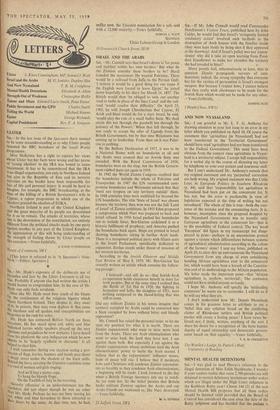ISRAEL AND THE ARABS SIR,—Mr. Connell says that Israel's desire
is'`for peace and stability within her own borders.' But what do the Zionists consider these borders to be? Herd founded the movement. He wanted Palestine. There would be a railroad from Jaffa to the Persian Gulf. '1 believe it would be a good thing for our cause if the English were forced to leave Egypt,' he jotted down hopefully in his diary for March 24, 1897. The British would then 'be obliged to seek out another road to India in place of the Suez Canal' and the rail- road 'would resolve their difficulty.' On April 23, 1903, he told Joseph Chamberlain that Cyprus, El Arish and Sinai would do for a start. Israel, he said, `would play the role of a small buffer State. We shall attain this not through the goodwill but through the jealousy of the Powers.' When that fell through, he was ready to accept the offer of Uganda from the British Government, but by that time Wcizmann was coming up to leadership. From then on it was Pales- tine or nothing.
By the Balfour Declaration of 1917, it was to be a National Home with no boundaries at all and the Arabs were assured that no Jewish State was intended. With the Royal Commission of 1936, boundaries were on the map, but the British Govern- ment rubbed them out again in 1939.
In 1942 the World Zionist Congress resolved that the boundaries include the whole of Palestine and Transjordan. In 1947 the UN recommended com- promise boundaries and Wcizmann advised that they 'must not trespass on any territory outside' them. In 1948 armistice lines were stabilised far beyond the UN boundaries. The title 'State of Israel' was chosen because the territory then won was not the full 'Land of Israel' of Zionist ambitions. In 1955 Eden proposed a compromise which Nuri was prepared to back and Israel refused. In 1956 Israel pushed her boundaries out to include Sinai; Ben-Gurion acclaimed it as a historic fulfilment of prophecy; and America pushed the boundaries back again. Maps are printed in Israel showing boundaries taking in further Arab lands. There is a recognised political party with fifteen scats in the Israel Parliament, specifically dedicated to expansion. Jordan stands under threat of invasion of her western territories.
According to the Jewish Observer and Middle East Review of May 8, 1959, Mr. Ben-Gurion has recently written an article which contains the follow- ing passage :
I believed—and still do so—that Jewish-Arab co-operation holds enormous benefit in store for both peoples. But at the same time I realised that the Battle of Tel Hai in 1920, the fighting in Jerusalem and Jaffa, the slaughter of 1921, were nothing compared to the blood-letting that was still to come.
Did any militant Zionist in his senses imagine that territory occupied by Arabs could be converted into a State occupied by Jews without bitter and bloody opposition?
Mr. Connell has raised the personal issue; so let me state my position for what it is worth. There are Zionist expansionists who want to seize more land from the Arabs. There are Arab eliminationists who want to seize back the land they have lost. I am against them both. But especially I am against the Zionist expansionists whose ambitions feed the Arab eliminationists' power to incite the Arab masses. I believe that as the expansionists' influence wanes, hope of peace will rise. I believe that if moderate Jews and Christians will condemn Zionist expansion- ists as forcibly as they condemn Arab eliminationists, a beginning will be made. I look forward to the day when a British Foreign Secretary can say as much. As yet none has. So the belief persists that Britain backs militant Zionism against the Arabs and our Arabs friends are weakened or, like Null, destroyed. —Yours faithfully,


































 Previous page
Previous page